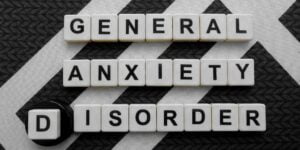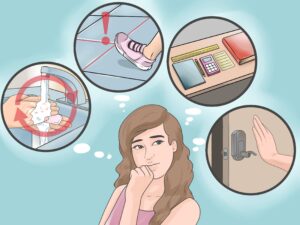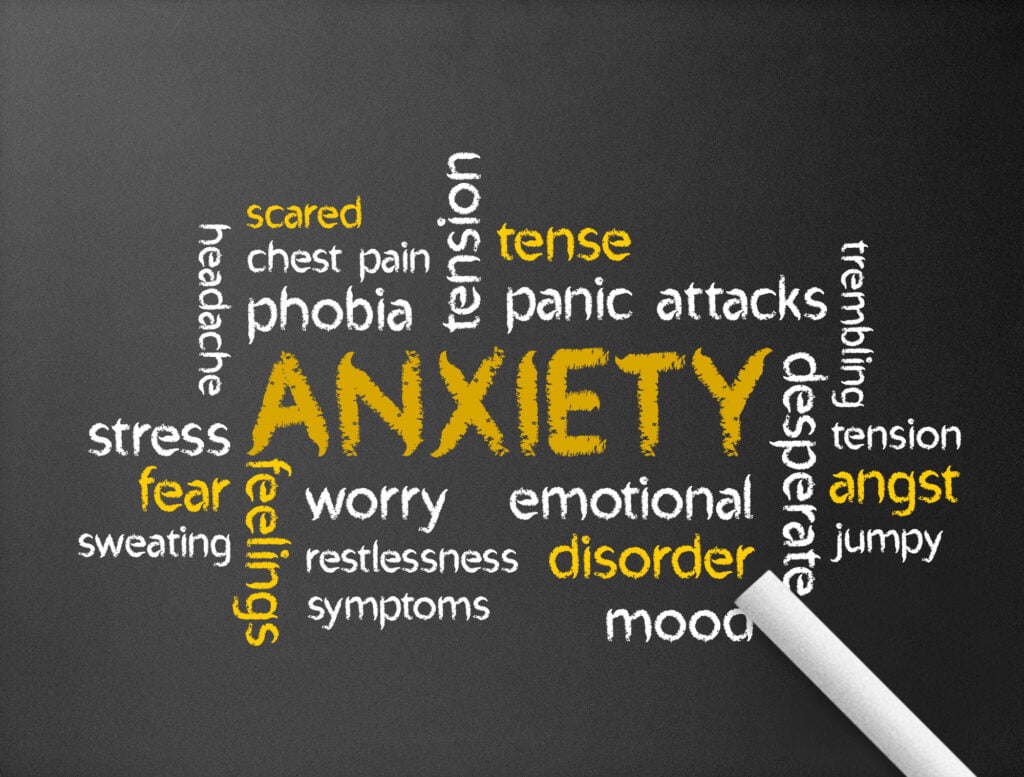Stress and anxiety are two common feelings that many people experience in their day-to-day life. It is important to have a plan for dealing with these emotions. If not dealt with, they can cause you health problems. In this blog post, we will talk about the feelings of stress and anxiety. We will talk about what happens when someone gets anxious. We will also talk about different ways to help people who are feeling that way. It is important to know that people feel stressed or anxious sometimes. It does not mean they have a mental health disorder. If they become overwhelming, however, and affect your ability to function properly that is when they need professional attention.
Contents
Stress
Stress is an important part of life. It is good in some situations. It helps you mentally and physically. But act carefully because it can make your body feel bad. Five common myths about how people cope with the stress are:

- People should only seek medical attention when their anxiety becomes debilitating.
- Only those with a mental disorder need to seek help for their anxiety.
- People should simply try harder at the strategies they’ve already been using if they’re not working.
- People should avoid things that trigger their anxiety.
- It’s best to try and eliminate all stress from life.
Anxiety
Anxiety disorders are common in India. An estimated 18% of Indians struggle with anxiety at some point during their lifetime, according to a search. The most common types are as follows:
- Generalized Anxiety Disorder (GAD), followed by
- Social Phobia or Social Anxiety Disorder,
- Specific Phobias like Animal phobias and
- Panic Attacks
- obsessive-compulsive disorder (OCD),
- post-traumatic stress disorder (PTSD)
It can be hard to do all the things we have to do. We worry about staying alive, and we worry about money. It is no surprise that there is stress in our lives. These disorders are common in children and adolescents, with a prevalence of 12%. Sometimes anxiety can be caused by trauma or abuse experienced during childhood.
Generalized Anxiety Disorder

A mental disorder where someone worries or feels tense even when there is nothing to worry about. People with this disorder are worried about many things. They worry about problems with their health, money, family problems, or difficulties at work. The percentage of adults with this condition in India is between five and seven percent. More women than men have GAD, and it usually develops around the age of thirty.
Some people think that there is a link between anxiety disorders and other family members. If you have close relatives who have an anxiety disorder, then you are at higher risk of having one too. There is no single cause of generalized anxiety disorder. Panic attacks cause a person to have a lot of different problems. They might feel stuffy, dizzy, or even go to the bathroom on themselves.
Symptoms of Generalized Anxiety Disorder
Stress can affect people in a lot of different ways. It could get worse, and you might not even know it has gotten worse.. You need to think about what is making you stressed. Then you can learn how to do it better. People with GAD may also have additional mental health issues such as depression or substance abuse disorders. A person with a generalized anxiety disorder may feel panic, worry, and tension. This is called mental illness and can be tough to deal with. If you don’t get help, your symptoms will just get worse. You should take care of your mental health or else it will keep getting harder. Depression and GAD will never go away on their own. If you ignore the warning signs, it will only make things more difficult to solve.
- Mood swings
- fatigue
- muscle tension
- Having a hard time focusing on day-to-day tasks.
- People can be scared of making contact with other people and going out in public. They may be afraid that they will show signs that they are struggling with anxiety.
- A person can feel like their mind is always racing. This might make them worry about things that could happen in the future. This could keep them up at night.
- Having a hard time focusing on day-to-day tasks.
- Scared of initiating social contact for fear of showing signs that they might be struggling with anxiety.
Cause of Generalized Anxiety Disorder
- Genetics: Those who have a parent or sibling with an anxiety disorder are much more likely to develop one themselves.
- Psychology: Anxiety can be caused by stressful life events, especially those that occur during childhood and adolescence, because children do not possess the coping mechanisms required to deal with major stresses in their lives at a young age.
- Social causes also play a large role as well People often get scared when they are around authority figures. This is understandable because adults are usually in charge of them. Later, they might develop fears around these people .In addition, many psychological disorders such as depression and schizophrenia cause generalized anxiety symptoms due to chemical imbalances within the brain’s neurotransmitters (in particular dopamine).
- Environment: Those who live in urban areas are more likely to experience social anxiety, whereas those living in rural areas are more at risk of developing agoraphobia.
Social Phobia Anxiety
People with social phobia anxiety are afraid of judgements and embarrassments. They fear that they will be rejected, ridiculed, and humiliated in public situations. For some people, the feelings can become so intense as to cause a panic attack. Social phobias may begin at any point during life but usually develop between 12 – 18 years old. There is no single known cause for this disorder although it tends to run in families.
People with social phobia are more likely to develop disorders like schizophrenia, bipolar disorder, or depression than people without it.. The symptoms of anxiety can be different for each person. Everyone has different fears so they have their own kind of symptoms. If you are not careful, some people may experience agoraphobia. This means that they are afraid of having a panic attack, so they avoid going to public places. This can lead to them becoming housebound.
Social phobia anxiety is also known as a social anxiety disorder. In the past, it was called “social neurosis” and more recently has been classified among several other types of generalized anxiety disorders A social anxiety disorder may make people feel depressed. They might get in a situation that they cannot control or makes them uncomfortable, like at parties or dating. People with this condition may feel lonely because others around them do not seem to be experiencing the same things. It is hard for them to understand how someone else feels unless they also have the same problem.. This can lead to feelings of shame which add on additional stress increasing their overall level of anxiety.
Treatment for Social Anxiety Disorder
There are many ways you can overcome social anxiety disorder or social phobia. People with these conditions should reach out for help. They can talk to counselors, doctors, family who will support them through this difficult period in their lives.
- People can learn how to deal with their fears by gradually exposing themselves in a step-by-step process which will eventually work its way up from easier things that trigger less fear or anxiety through harder ones until they are able to complete them successfully without any panic episodes occurring.
- People can learn how to deal with their fears by gradually exposing themselves in a step-by-step process which will eventually work its way up from easier things that trigger less fear or anxiety through harder ones until they are able to complete them successfully without any panic episodes occurring, This method is systematic desensitization and is quite effective once you learn how to do it correctly as well as sticking with whatever methods they choose.
- There are also many self-help books written specifically for those with social anxiety disorder, which has been very helpful for people all over the world who suffer from this condition that does not seem to be getting better despite trying different medications, counseling sessions, or other treatments on their own without any success.
Obsessive-compulsive disorder

Obsessive-compulsive disorder ( OCD ) is a mental health condition that involves having both obsessions and compulsions. Obsessions are thoughts that keep appearing in your mind, no matter how much you want to get rid of them. Many people know that these thoughts are not normal and might be a sign of mental illness. You know that they make you feel bad, but they make you feel good. It is hard to stop even though it is wrong. Compulsion is when you feel that you need to do something. If you keep doing it, the feeling goes away and makes you feel better. But if you stop, the feeling comes back and so does anxiety.
Obsessions
Obsession is a word used to describe repetitive and persistent thoughts, urges, ideas, images, impulses & memories which keep appearing in an individual’s mind causing them great anxiety because it doesn’t feel like their own making them worry constantly about what these could mean. These unwanted thoughts make people with OCD really upset. They especially get in the way when you try to do normal things, like going to work or school.
Compulsions
A compulsion is something someone does over and over again. They might need to do it a certain way. If they make mistakes, then they will need to start over again. This brings relief from worry, but the person can’t control this urge. An example of compulsion would be when somebody with contamination fears washes their hands continuously after touching money & door handles up to 50 times before being able to go through their day feeling at ease knowing that germs haven’t been passed onto them due to having touched these items first, if for some reason you didn’t wash your hands then they would go through the rest of their day worrying that they might have made other people sick.
Specific phobia
Some people have a fear of certain things. They might be afraid, but it’s not necessary to be afraid. For example, someone is scared of flying they might feel panicky even before getting on the plane. This can make it hard to travel. If you know that your feelings are too strong, then you might not be able to go on the trip. Around 19 million people are affected by specific phobias alone which equal about 12% of adults.
Some people who have had bad experiences might develop fears of things that are not usually scary. They want to avoid these things because they think they will be bad.
Panic attacks

A sudden period of intense fear or discomfort that comes on with no warning where the person having them will experience physical & emotional symptoms such as shaking, sweating, heart palpitations, nausea/vomiting. This can be tough because people are not able to breathe. The anxiety levels increase when they are not sure when another one will happen. This is hard for people who have this condition because they also want to lead a normal life.
If someone has a Panic Attack, it usually lasts for less than an hour. But if they do not treat the problem, the attacks can last for much longer. People with Panic Disorder might have Agoraphobia.
Treatment for Stress and Anxiety
 As you can see there are many different causes and effects of stress & anxiety which is why it’s important to get the correct treatment. There is not one specific thing that cures everybody with this condition, because every person is different. This starts by taking a test to find out what will work best for you.
As you can see there are many different causes and effects of stress & anxiety which is why it’s important to get the correct treatment. There is not one specific thing that cures everybody with this condition, because every person is different. This starts by taking a test to find out what will work best for you.
Cognitive Behavioral Therapy (CBT)
If somebody has had a bad experience in their childhood, they might need to talk about this. One can prefer Cognitive Behavioral Therapy ( CBT ). They will talk about how these experiences made them feel. They can also learn new ways of coping with negative thoughts or feelings. And the person might be less likely to have another panic attack because of this therapy.
Exposure Therapy
In this therapy, people see things that make them feel uncomfortable. People notice these things slowly. This treatment is can take a long time before the person starts to feel more comfortable in these situations. There are many different types of treatments for anxiety and stress but not everyone benefits from them. Doctors have found other ways which work for some people.
Meditation
Meditation has been researched thoroughly over recent years showing evidence that mindfulness-based practices such as yoga & tai chi help reduce physical symptoms associated with this condition due to teaching people how to relax through deep breathing exercises, meditation also gives you skills on being aware of what’s happening inside your body helping guide thoughts rather than reacting uncontrollably without factoring in any important details.
Mental Imaginary
When we feel anxious, it is sometimes hard to know what to do. Mental imagery techniques can help us understand how our body reacts when we get nervous and panic. You should try to do this by thinking about the thing you are afraid of many times. That way, it won’t be so scary. If this visualization takes place during an actual situation that triggers your fears it may help reduce any potential attacks from happening afterward because it prepares your brain & body on what to expect when these situations do arise making you feel more confident about facing them head-on.
Aromatherapy
In this, people use essential oils from plants to help reduce tension & relax muscles to get rid of stress and anxiety. Aromatherapy can be help people who have trouble sleeping and for lowering their stress.
Conclusion
For some, the symptoms of anxiety and stress disorder can be overwhelming. If you are experiencing any of these symptoms more often, go to the doctor. Anxiety and stress disorders are not only physically exhausting but also emotionally draining for those that experience them. With treatment options like therapy and medication available, there is hope for getting back on track with life again. It may be difficult to admit that you need help. But the more you talk about your feelings of stress or anxiety, the better at it you will get.
For more information, please contact MantraCare. Stress can have both physical and mental effects on the body, leading to negative consequences such as anxiety, depression, and even physical illnesses. If you have any queries regarding Online Stress Counseling experienced therapists at MantraCare can help: Book a trial Stress therapy session


